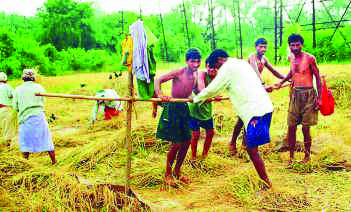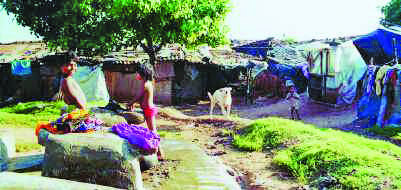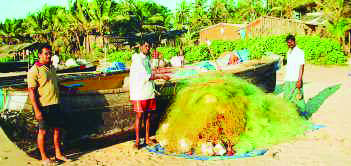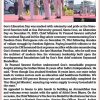Goa is abuzz with excitement as vintage bike and car owners, users, collectors and fans are decking […]

GOANS FEEL THAT MIGRANTS ARE TAKING OVER
Aug 24- Aug 30 2019, Migrants August 23, 2019WORKERS: Seasonal workers from Karnataka in a paddy field near Fort Aguada. They hail from Zinid taluk in Bijapur district and were forced to migrate by drought conditions
By Ravi Sharma
Goans don’t mind illiterate migrants to do menial jobs but are afraid that they might takeaway seats in colleges and jobs in the government particularly reserved for the OBCs. The Bhandari Samaj has expressed concerned over Lamanis and even Christian migrants changing their surnames to Naiks and Shirodkars to take advantage of OBC quota and the social welfare schemes of the government. As in the US and the UK there is hostility over ‘bhaile’ becoming a burden on the social welfare budget. In the Assembly it was suggested that the domicile period should be extended from 15 to as much as 50 years
FROM Ponnuswamy Marianathan to Mario Nathan, the change of name was not easy for the tailor born in Thiruvennainallaur town in Villupuram district in Tamil Nadu. But he did it to survive in his adopted land, one of the countless migrants who have made Goa’s capital Panaji their home. “Mario Nathan sounds more Goan. I have been here for 18 years, have a ration card and even learnt Hindi and Konkani. But I’m still considered a ghati, the local slang for country bumpkin. Hopefully, my new name will change that,” he says.
Thousands of migrants like Mario Nathan, especially those involved in petty trade or working as labourers in the construction industry, agriculture, fishing and road building, are trying their best to melt into the local population, but with little success. The migrants working in the organised and unorganised sectors in the State are estimated at 3.3 lakhs, up from 1.55 lakhs in 1991; the 2001 Census puts the State’s population at 13.44 lakhs.
Mario Nathan changed his name of almost 40 years primarily to increase his chances of getting a residential site under the Ambedkar Awas Yojna, a social security scheme of the State government that gives the domiciled homeless 100-square-metre plots at subsidised rates. It was also a mask to escape from hostile natives who increasingly believe that they are being swamped by “uncivilised migrants” in the daily job stakes in urban centres such as Panaji, Vasco da Gama, Madgaon, Mapusa, Murmagoa and Ponda and in beaches such as Calangute, Vagator and Anjuna.
INCREASED CRIME?
Migrants are also blamed for the spurt in the crime rate. Unfairly so, says Director-General of Police Amod Kanth. “Most of the law and order problems involving migrants are migrant on migrant’. Yes, some migrants may be involved in theft and so on, but in proportion to the population it is well within control and certainly not alarming. The majority of rapes that have taken place are from within the local community.” At the meeting of Chief Ministers of the Bharatiya Janata Party in September in Delhi some years previously, Goa’s Manohar Parrikar said a small State like Goa could not afford to bear the burden of thousands ofcheap’ migrant workers. Though he claimed then that he was misquoted by the local press, he told Frontline that “too much of migration [could] cause social tension”; if slums sprang up there would be “resentment among the local Goan people”. Parrikar said his government was trying to create conditions — such as increased mechanisation in the construction industry — that would “automatically bring down” the number of people migrating to Goa for work.

Parrikar said: “I cannot stop migrants from coming to Goa, nor am I forcing anyone out. But I am trying to create conditions whereby migration is not encouraged. But it is not in the economic interest of the country to have low-paid jobs converted into migration. When you have migrants who earn 2,000-2,500 a month, you are straining the resources in that area. And it is costing the government a great deal more than what is earned by those individuals. So, while migration [of technically qualified people] at the higher levels may be desirable or affordable, low-economic-impact migration is economically detrimental.”
Christopher Fonseca, general secretary of the All India Trade Union Congress (Goa) and State secretary of the Communist Party of India responded: “How can the Chief Minister want only technically qualified people? This is selective fascism. While capital has free access, why shouldn’t labour? This is against the very grain of normal processes in society. This anti-people mindset is unscientific, lacks informed debate and is seeping into institutional and political parties, leading to chauvinism and uncalled for attrition in society. It is a violation of basic human rights.”
It was “we who called these migrants in the first place”, he said. “They are creating wealth in the State, [and are] not sponges on our economy. Some of these migrants have been here for 30 years, yet the arms of the government (departments like Health, Labour, Civil Supplies and Housing) haven’t touched them. Parrikar has not understood the social dynamics of society. It stems from the failure of the government to manage society, civic issues and the infrastructure.”
Migrant bashing and playing up regional chauvinism have appealed to the middle classes and politicians. It was the Congress government of Luizinho Faleiro that legislated for 80% reservation for natives in Goa’s industries. But Faleiro was critical of Parrikar’s stand on migrants. He said: “Parrikar’s statements on this have to be condemned. Migrants come here not to idle but to work; they are setting right a shortage. The Parrikar government has failed to create adequate jobs and training facilities and is trying to divert the attention of the public by blaming migrants for every ill.”
POLICE ACTION
Migrants are also discriminated against when it comes to filing, in police stations, the Verification form (T-Form)’ and theTenant/Seasonal Visitors Verification’ form introduced by the Parrikar government in 2000. Though they are mandatory for all, including native Goans who change residence, and require the person to mention details of any arrest or conviction, besides native address and references of two persons in Goa and in the place of origin, only the non-Goan worker in the unorganised sector is targeted.
While the lower rungs of the police machinery view the requirement as voluntary, Parrikar had told Frontline that “every newcomer to a locality had to report himself to the (jurisdictional) police”. He said it was not voluntary but compulsory under Section 144 of the Code of Criminal Procedure. “The Goa police itself [is] a voluntary force and is not fully aware of this being compulsory,” he added. Justifying the need to seek out such details, Parrikar had said it was perfectly legitimate for the government to keep tabs on who was coming to Goa.
MIGRANTS NEEDED
THERE is little doubt that Goa needs its migrants, especially if its dreams of industrialisation are to become a reality. Every important post-liberalisation project — the Mormugoa Port Trust, Goa University, the Konkan Railway — and now the refurbishing of buildings and roads on the Panaji waterfront at a cost of over 120 crore for the International Film Festival of India beginning on November 29 have all been possible only because of migrant labour. Most if not all the labourers involved in road and building construction and in fishing and agriculture are from Maharashtra and the northern districts of Karnataka and had come in the decades gone by. Today’s migrants are mainly from Andhra Pradesh, Kerala, Bihar, Uttar Pradesh, Orissa, Jharkand and West Bengal. They endure the taunts and the discrimination because work is available in plenty and the wages (around100) are better than what they get back home even if they are lower than what the natives get.
Said Mohammed Jaffer, a migrant waiting at the main tinto (road intersection) in downtown Mapusa: “I left Muzaffarpur in Bihar five years ago. There the wages are low, and there is no regular work. Here work is available and the wages, at 110 a day, are good. We spend50 and save the rest. We come here (to the tinto) every morning and contractors take us to the construction sites. Of course, some days we don’t get work and sometimes the contractors cheat us.” Most of the migrants working in the unorganised sector have a similar tale to tell. A combination of unemployment, low wages and the failure of the rains forced them to migrate.

Said Mahadevappa Basavaraj from Gadag (Karnataka): “Many of us have land in our villages, but what is the use when there is no rain? The choice was to work either in Goa or in Bangalore. The Karnataka government should do something for us, give us some foodgrains and money so that we can restart our lives. Even the sale of Kannada newspapers has been stopped in the Mapusa market. We don’t know what is happening outside. We have been forced to come here and do menial jobs. The police harass us… .”
Santosh Kumar of Jaunpur in Uttar Pradesh runs a small provision store at Kattebaina in Vasco da Gama. He said the police beat him up once because he had given “an interview to a television channel” on the government’s decision to demolish hutments in nearby Baina.
But according to Anthony Pacheco, an autorickshaw driver from Mapusa, the police are not doing enough. “Eight months ago the police asked us for our suggestions on how to solve the overcrowding and unruliness in Mapusa. But nothing has happened,” he said. “These people (migrants) are dirty; they spit everywhere, block the tinto and roads, and are thieves. All that the police do is pick some of them up every Saturday and then release them… We want them to leave. But why will they? They are getting more money here than they can get in their hometowns, and the liquor here is cheap.”
Though the building industry is in the hands of native Goans, contractors seek out migrant labour. Said Chandrakanth Beatkeaker, a contractor in Mapusa: “Most of the migrants are honest and hardworking. The same work that they do will take a local worker double the time and I have to pay a higher wage. The natives want to do only mechanical jobs, such as working with a drill, driving a bulldozer, and so on. But who will remove the sand, carry it out, transport the bricks?”
Social scientists say it is not surprising that the natives are not interested in low-end jobs. Traditionally, in any society it is migrants who do the low-end jobs. “Physical work is not the strength of the Goan population,” Parrikar said. But Goans do the same jobs when they go as migrants to West Asia or Europe.
Owners of fishing trawlers are on the lookout for cheap labour. While migrants from Kerala and Andhra Pradesh demand around 100 a day, those from Karnataka work for80 or 90. But now fisher folk from Orissa are ready to work for60 (which is double what they get in Orissa) and this has sparked off unrest among the migrant communities. Said fisherman Odappa Chelevadi, whose father was a migrant from Karnataka’s landlocked Basavanabagewadi: “These people (Oriyas) not only accept lower wages, but are prepared to stay on the trawlers for many days at a stretch. So the owners are using them.”
Chelevadi is upset that though he was born in Kattebaina, and even has a ration card, he cannot buy a boat. Only ethnic Goans can. “In 1994 some Keralities tried to put out their own launches, but these were burnt by the natives at nearby Kariwada,” he said.
With hardly 5% of the ethnic population employed in agriculture, seasonal migrants working in large teams, especially from northern Karnataka, are an integral part of the operations. According to the government, it is trying to encourage more natives to get back to agriculture by offering incentives to grow horticultural crops. Parrikar had said he was considering an amendment to the Agricultural Tenancy Act, 1964, so that landowners can contract out their land for a limited period without the fear of losing it. This, it is felt, would encourage unemployed youth to get into agriculture. Currently, almost a third of the State’s 1.77 lakh hectares of cultivable land is lying fallow as the owners fear that contracting it out may jeopardise their rights.
According to Roland Martins, coordinator of Goadesc Research Centre, a non-governmental organisation, the government must have a clear policy on migrants and spell out the requirements that contractors have to fulfil before they bring in migrant workers. “The Social Welfare Department, the Directorate of Health Services and the Women and Child Welfare Department should be asked to monitor the conditions of migrants belonging to the unorganised sector,” he said. “Right now contractors just bring in groups of workers and dump them after their project is over. The government should also liaison with the States from where these migrants come.”
While providing welfare measures to migrants is the crux of the issue, Parrikar had agreed that contractors should be responsible for the migrants they bring in. He said: “Contractors bring one group of migrants, leave them here after a project and bring in another group for their next project. They are supposed to provide facilities like water, housing, toilets and creches, which they do not. We are forcing them to provide these facilities as per the law. This will not only act as a barrier to bringing in an irrational number of workers, but also reduce the requirement of migrants. If they do not [provide these facilities] they will be blacklisted.” Parrikar said the escalation in a project’s cost because of the enhanced facilities was not a cause for concern. But can he take on the contractor lobby?
The attempts at cultural protectionism have not turned xenophobic, nor has it been allowed to slip into what the Shiv Sena did in Mumbai in the 1970s and 1980s. But can Goa, which is so dependent on migrants and its bigger neighbours for almost everything, even rice and milk, afford to do that? After all, there are more Goans outside Goa than there are non-Goans in Goa.
Coutesy: Frontline















